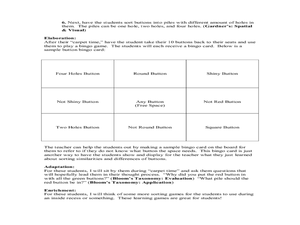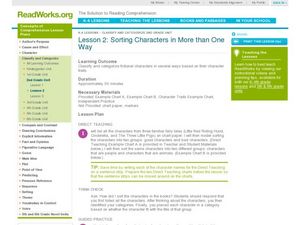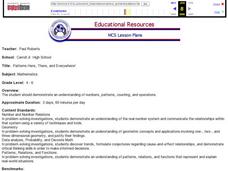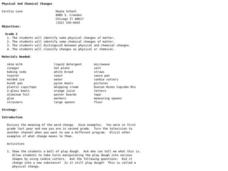Curated OER
Exploring Polygons and The Greedy Triangle
Excellent lesson! Anne Linehane's geometry story, The Greedy Triangle, offers an opportunity to practice forming various types of polygons with your learners. Using elastic bands (or Chinese jump ropes),...
Smarter Balanced
Classifying Vertebrates
What features do scientists use to classify animals into groups? Class groups examine a series of paired images of vertebrates (a bass and a trout, a toad and a newt, a crocodile and a tortoise, an owl and a robin, a tiger and a bear)...
Discovery Education
Clutter Cutter
Challenge young learners to cut the clutter with this fun engineering project. As employees of a home and office supply company, young engineers are asked to develop devices that organize everyday items. After participating in a...
Curated OER
Sorting Sets
Here is a simple sorting activity which is appropriate for pre-k and kindergarten learners. Pupils sort each of four items into the correct group, then count the totals and write the numbers in the boxes provided. Along with being a good...
Curated OER
Sorting Things Out
Written to examine seeds that grow in Kansas, you can adapt this lesson to anywhere you live. Learners sort a mixture of five different seeds to by any characteristic of their choice. When your budding scientists are exploring the life...
Curated OER
Grouping Buttons
Looking for a good instructional activity on counting and sorting? This instructional activity is worth a look! In this classification instructional activity, learners sort buttons by color, shape, shiny verses not shiny, or number of...
Curated OER
Rule It Out
Here's a way to create math fact flash cards! Learners create their own cards and sort them into matching categories. Students start with addition and work their way up to harder math such as multiplication, and are asked to notice...
Curated OER
Are You One Of Us?
Students discover how to classify things based on their similarities and differences. Students give the characteristics of insects and create a classification list. Given examples of various types of insects, students classify them...
Curated OER
Sorting Characters in More Than One Way
Introduce your class to characterization. Familiar story characters are sorted into "good" and "bad" categories based on the characters' personalites and actions in the story. The class discusses and describes characters they have read...
Curated OER
Sorting
A lesson on classification and sorting is here for you. Elementary schoolers participate in an interactive computer game in which they sort books by theme. They take a trip to the library to observe and discuss how books are sorted, and...
Curated OER
Patterns Here, There and Everywhere
Pattern recognition is a skill often used in mathematics. Learners count and sort manipulatives, organize the data into a graph and answer questions about the information displayed. They collect the objects to be used and create patterns...
Curated OER
Do You Really Need It?
A large part of understanding personal finance and economics is grasping the concept of wants and needs. This presentation provides students with basic yet effective definitions of wants, needs, and how they effect advertisements and...
Curated OER
What's My Rule for Sorting?
Young scholars view objects sorted by one characteristic and name that characteristic. In this sorting rule lesson, students explore to find a new characteristic and write a description of that rule. In early grades the rule...
Curated OER
Creating Groups and Sorting
Learners practice classifying. In this classifying and oral language lesson, students listen to the story My Big Truck Book by Roger Priddy and identify similarities between the trucks described. Learners sort the children in their class...
Curated OER
Sorting Living and Nonliving Objects
Third graders sort and classify objects. In this sorting lesson, 3rd graders sort small objects such as cereal or candy. Then, students classify and sort objects that are living or nonliving.
Curated OER
Buzzing is BEE-lieving
Students investigate insects. In this insect instructional activity, students explore various insect models and identify the characteristics of each. Students observe insects outside and tally how many insects they observe.
Curated OER
Teaching with Collections
Students examine collections. In these real-world collections lessons, students examine and describe buttons and shells. Students will then sort, classify, and graph items according to various indicated descriptors.
Curated OER
Classifying
For this classifying worksheet, learners are given 8 rows of illustrations of animals. Students try out various ways to organize the animals in a classification system following the directions. They try a 2 groups system and a 3-5 group...
Curated OER
Classifying
For this words that do not belong worksheet, students read 12 groups of 4 words and choose the word in each group that does not belong with the other words. Students print their answers on the lines provided.
Curated OER
What's in the Refrigerator?
In this food worksheet, students color an empty refrigerator, and cut out various food items. Students decide which foods they would like to paste in the refrigerator. They then answer 5 questions about these foods.
Curated OER
Create An Insect
Learners create a new species of insect. They create a list of insect characteristics and use this as a springboard to draw an insect of their own. Students write a brief descriptive paragraphs about their insect, giving particular...
Curated OER
Living and Nonliving
Students use their senses to record and collect data. In How Do I Classify Things in My World?, students practice classifying objects as living or nonliving. In Is it Real Or Pretend?, students group objects as real or pretend. In What...
Curated OER
Physical And Chemical Changes
Second graders identify physical and chemical changes of matter. They distinguish between physical and chemical changes. They classify changes as physical or chemical.
Curated OER
Rocks, Gems, and Minerals
Fourth graders review by sorting and classifying minerals. They describe the composition of a mineral and use rules to classify that mineral. They complete a mineral scratch test and place the results in a table in the second activity.

























